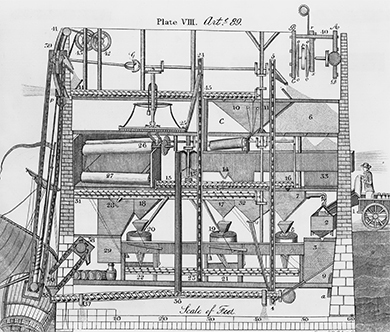| << Chapter < Page | Chapter >> Page > |
The Boston Associates’ cotton mills quickly gained a competitive edge over the smaller mills established by Samuel Slater and those who had imitated him. Their success prompted the Boston Associates to expand. In Massachusetts, in addition to Lowell, they built new mill towns in Chicopee, Lawrence, and Holyoke. In New Hampshire, they built them in Manchester, Dover, and Nashua. And in Maine, they built a large mill in Saco on the Saco River. Other entrepreneurs copied them. By the time of the Civil War, 878 textile factories had been built in New England. All together, these factories employed more than 100,000 people and produced more than 940 million yards of cloth.
Success in New England was repeated elsewhere. Small mills, more like those in Rhode Island than those in northern Massachusetts, New Hampshire, and Maine, were built in New York, Delaware, and Pennsylvania. By midcentury, three hundred textile mills were located in and near Philadelphia. Many produced specialty goods, such as silks and printed fabrics, and employed skilled workers, including people working in their own homes. Even in the South, the region that otherwise relied on slave labor to produce the very cotton that fed the northern factory movement, more than two hundred textile mills were built. Most textiles, however, continued to be produced in New England before the Civil War.
Alongside the production of cotton and woolen cloth, which formed the backbone of the Industrial Revolution in the United States as in Britain, other crafts increasingly became mechanized and centralized in factories in the first half of the nineteenth century. Shoe making, leather tanning, papermaking, hat making, clock making, and gun making had all become mechanized to one degree or another by the time of the Civil War. Flour milling, because of the inventions of Oliver Evans ( [link] ), had become almost completely automated and centralized by the early decades of the nineteenth century. So efficient were Evans-style mills that two employees were able to do work that had originally required five, and mills using Evans’s system spread throughout the mid-Atlantic states.

At the end of the eighteenth century, most American families lived in candlelit homes with bare floors and unadorned walls, cooked and warmed themselves over fireplaces, and owned few changes of clothing. All manufactured goods were made by hand and, as a result, were usually scarce and fairly expensive.
The automation of the manufacturing process changed that, making consumer goods that had once been thought of as luxury items widely available for the first time. Now all but the very poor could afford the necessities and some of the small luxuries of life. Rooms were lit by oil lamps, which gave brighter light than candles. Homes were heated by parlor stoves, which allowed for more privacy; people no longer needed to huddle together around the hearth. Iron cookstoves with multiple burners made it possible for housewives to prepare more elaborate meals. Many people could afford carpets and upholstered furniture, and even farmers could decorate their homes with curtains and wallpaper. Clocks, which had once been quite expensive, were now within the reach of most ordinary people.

Notification Switch
Would you like to follow the 'U.s. history' conversation and receive update notifications?